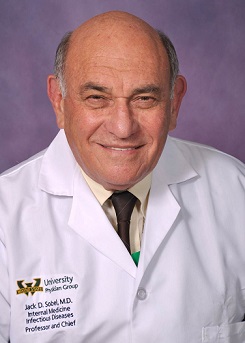
To the School of Medicine Community:
Many of you have expressed concern about the university report that tests have identified traces of legionella bacteria found in the first-floor men's bathroom near Conference Room 1200 in Scott Hall.
My expertise is in infectious diseases. I want to assure you that legionella, the bacterium that causes Legionnaires' disease, is a relatively common bacteria that poses very little risk to healthy people. While we are exercising caution, you should not be alarmed.
Legionnaires' disease cannot be spread from person to person. Nor can you acquire the disease from drinking water.
As a precaution, the lone bathroom in Scott Hall has been sealed as further testing continues.
Legionella was also identified in a private bathroom in the Faculty Administration Building on main campus and in a men's bathroom in the Cohn Building. Those bathrooms have also been closed for further evaluation.
Preliminary results indicated that the cooling towers in three campus buildings - the Purdy/Kresge Library, the College of Education Building and the Towers Residential Suites -- tested positive for legionella. Remediation in those towers began immediately.
As a result of these findings, the university will continue comprehensive testing across the campus. PathCon Laboratories, a leading legionella consulting group, will return to campus Saturday to continue testing every building that has a cooling tower. These independent consultants will also provide guidance and recommendations on the testing of potable water on campus.
All of these tests were conducted after a single university employee who works in the FAB building was diagnosed with Legionnaires' disease. That person is receiving treatment. No other person on the campus has been diagnosed with the disease.
Legionnaires' disease is a form of pneumonia that is spread through inhalation of water droplets that contain the bacterium. The disease is treatable if diagnosed early. The vast majority of individuals are not at risk. Older people with certain pre-existing conditions and compromised immune systems are at greater risk, but even in those cases the chances of contracting the disease are slim.
To keep us abreast of this issue, the campus has developed a website containing the latest information and frequently asked questions about legionella. You can access that website here.
I fully understand your concern, and I urge you to remain calm and carry on with your duties, as I intend to do, as the experts address this issue.
Jack D. Sobel, M.D.
Dean
Distinguished Professor
Wayne State University School of Medicine